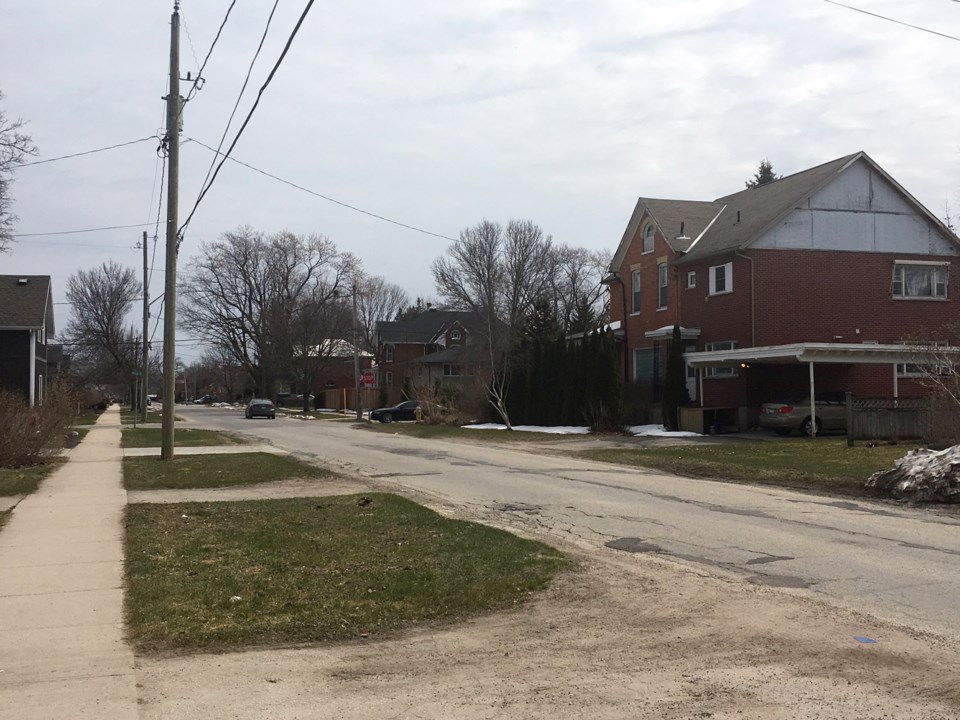Collingwood is beefing up its boulevard-related bylaws, starting with the one that regulates construction and storage of materials on boulevards, roadways and right of ways.
Kris Wiszniak, public works and transit coordinator for the town of Collingwood, gave a presentation at the April 23 meeting of the Development and Operations Services Committee on the proposed draft bylaw intended to regulate activity on municipally-owned right-of-ways and public lands such as boulevards.
“The implementation of this bylaw comes with the increase of unapproved and undocumented work being done within the municipal right of ways,” states the staff report presented to the committee. “The increase of damaged and poorly reinstated infrastructure can cause a serious liability to the municipality, and can also cost the municipality additional resources.”
According to Wiszniak’s presentation, the bylaw as it is proposed would require anyone doing construction on a right of way, using right of way or road for storage, obstructing a roadway, or making alterations to boulevards to obtain a permit from the town. It would replace a road cutting bylaw and a boulevard activity regulation bylaw, both of which are about 30 years old.
The proposed bylaw will update the permit application process for contractors whose work requires cutting into roads, curbs or boulevards and will include an option for the town to collect a deposit to be refunded when the work is completed according to the town’s standards.
The bylaw, if adopted, will prohibit storing objects or materials on roads, including sporting equipment such as road hockey nets, skateboard ramps and basketball nets.
Wiszniak said people will still be able to set up a basketball net (or other sporting equipment) on the road when it is safe, but the net will have to be brought in and stored on private property after it is used. It cannot be kept on the road overnight or when not in use.
The bylaw would prohibit depositing, throwing, spilling or tracking material such as waste, oil chemical, soil, debris or other substances onto the road way. It also specifies snow and ice is not to be put on any sidewalk or roadway. If it is put on a boulevard, it must be on a boulevard that borders the property from where the snow or ice came.
The bylaw would require a permit if a contractor or resident wishes to place equipment, a container, a trailer or any landscape and construction material in a roadway.
If the bylaw is adopted, residents and contractors will require a permit for any alteration of a town boulevard that goes beyond regular maintenance such as grass cutting.
The proposed bylaw also restricts the following on a boulevard in Collingwood:
-
Inorganic ground cover exceeding 19mm
-
Brick, concrete, interlocking brick, gravel or soil that protrudes above the existing grade
-
Plants or shrubs taller than 45 cm or that impede drainage
-
Grass exceeding 15 cm tall
-
Alteration of the boulevard to expand parking areas
-
Damaging or removing existing landscaping, planting or trees placed by the town without the town’s consent
-
Installation of irrigation or electrical wiring without the town’s consent
This proposed draft bylaw does not address parking on boulevards. Currently the town does not have a bylaw to prohibit parking on boulevards.
There was a recent motion from council directing staff to look into further regulation of parking on boulevards and staff are due to report back soon on their findings and recommendations.
The road occupancy permit will come with a $125 fee. It will require the contractor to provide proof of liability insurance, or if it is the homeowner doing the work, it will require a letter of proof of insurance for the property. The applicant may also be required to provide details on the hours of work, the equipment to be used, and provision for traffic control or warning devices. The town may also require the contractor to notify affected parties of the work ahead of time, and let emergency and transportation services know of disruption of traffic, such as a reduction to a single lane.
Council is set to vote on the proposed road occupancy bylaw at a meeting April 30.



